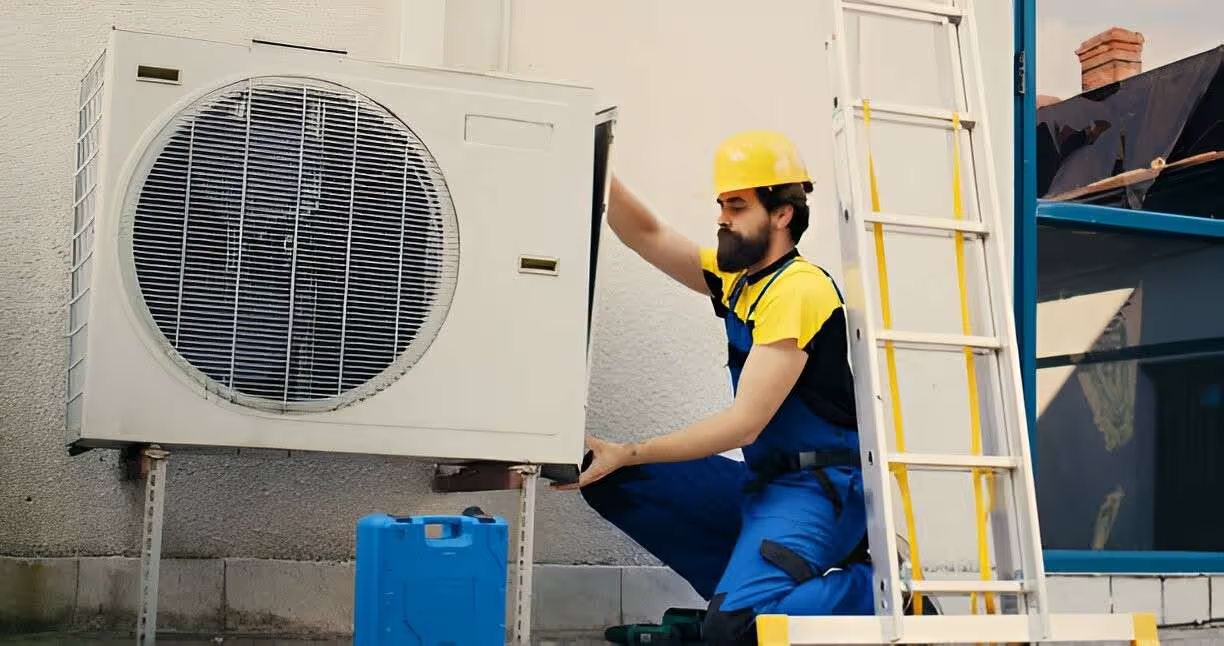Heat Pump Service in Riverview, FL


Why professional heat pump service matters in Riverview, FL
Riverview’s humid subtropical climate means heat pumps do heavy lifting for cooling most of the year and handle moderate heating in winter. High humidity increases system runtime and condensation issues, while summer storms and occasional flooding raise the risk of corrosion and electrical damage. Proper service improves comfort, reduces energy bills, prevents premature failure, and helps systems meet Florida building code requirements and manufacturer warranty terms.
Common heat pump issues in Riverview, FL
Homeowners in Riverview typically call for these problems:
- Poor cooling or weak airflow due to dirty filters, blocked coils, or failing blower motors
- Short cycling caused by thermostat faults, refrigerant issues, or an oversized/undersized unit
- Refrigerant leaks and undercharge leading to reduced capacity and frozen evaporator coils
- Compressor failure or capacitor problems that prevent the outdoor unit from starting
- Corrosion of outdoor coil and connections from humid, salty air exposure
- Clogged condensate drains and secondary water damage in high-humidity conditions
- Electrical issues after storms: tripped breakers, damaged contactors, or surge-related component failure
- Duct leaks or insulation problems that reduce efficiency and comfort
Heat pump services offered
- Installation: Proper sizing (Manual J load calculations), matching indoor/outdoor components, compliance with Florida codes, and correct refrigerant and oil charge for optimal efficiency. Options include single-stage, two-stage, and variable-speed systems with high SEER ratings.
- Repair: Diagnostic-driven repairs for compressors, capacitors, motors, fan assemblies, reversing valves, thermostats, and refrigerant systems. Repairs use OEM-quality parts or recommended replacements.
- Replacement: Guidance on when replacement is more cost-effective than repair (age, repair frequency, efficiency loss) and options for modern refrigerants and higher-efficiency units.
- Preventative maintenance: Comprehensive tune-ups including filter replacement guidance, coil cleaning, lubrication, electrical checks, refrigerant pressure check, condensate drain cleaning, and performance testing.
- Emergency service: Response for no-cool/no-heat situations, electrical failures after storms, refrigerant emergencies, and safety-related faults.
- System diagnostics: Thorough diagnostics using airflow measurements, temperature splits, refrigerant gauges, electrical testing, and sometimes thermal imaging to identify root causes accurately.
- Retrofit and upgrades: Converting older systems to modern refrigerants, adding variable-speed air handlers, zoned systems, smart thermostats, surge protection, and UV or dehumidification upgrades for improved indoor air quality and efficiency.
- Parts sourcing: Access to OEM and high-quality aftermarket parts for older or out-of-production units when possible.
- Service plans: Scheduled tune-ups, priority scheduling, diagnostic fee credits, and discounts on parts and labor under maintenance agreements.
Diagnostic and service process explained
- Initial evaluation: Visual inspection of indoor and outdoor units, thermostat check, and homeowner interview about symptoms and operating history.
- Performance measurements: Record temperatures, airflow, electrical load, and refrigerant pressures to compare against manufacturer specifications.
- Root-cause identification: Use targeted tests (electrical continuity, motor winding resistance, leak detection, oil analysis in rare cases) to pinpoint failures rather than treating symptoms.
- Transparent estimate: Technicians present repair or replacement options with clear explanations of benefits, expected life extension, and how each option affects efficiency and operating cost.
- Repair or recommended replacement: Execute agreed work using proper tools and safety practices, test system after service, and document findings and actions for the homeowner.
Technician qualifications and standards
Technicians servicing heat pumps in Riverview should be:
- Licensed HVAC professionals complying with Florida licensing requirements
- EPA Section 608 certified for refrigerant handling
- NATE-certified or through equivalent training programs for best-practice diagnostics and installations
- Background-checked, drug-screened, and committed to ongoing training in new refrigerants and inverter technology
- Insured and familiar with local code and permitting processes
Response times and transparent pricing
- Typical response: Routine maintenance and non-emergency repairs are commonly scheduled within 24-48 hours.
- Emergency response: Many providers aim to respond to urgent no-cool or electrical-failure calls within a few hours during business periods; availability may vary during storms.
- Pricing approach: Transparent, itemized estimates that list diagnostic fees (often credited toward repair), labor rates, parts costs, and permit fees when applicable. Customers receive clear explanations of repair vs replacement economics and options for flat-rate quotes for standard services.
When to repair vs replace
Consider replacement when:
- The unit is older than 10-15 years and requires frequent repairs
- A major component like the compressor has failed and replacement cost approaches the value of a new system
- Energy bills have increased significantly despite recent repairs
- The system uses an older refrigerant that is phased out and costly to service
- Upgrading would provide substantial efficiency gains or better humidity control for Riverview’s climate
Long-term benefits and maintenance tips for Riverview homes
Regular professional service yields:
- Lower energy bills through correct refrigerant charge and clean coils
- Fewer emergency breakdowns during peak cooling season
- Extended equipment life and preserved manufacturer warranties
- Improved indoor comfort and humidity control
Simple homeowner maintenance between professional visits:
- Replace or clean filters every 1-3 months during heavy use
- Keep outdoor unit clear of debris, vegetation, and mulch for proper airflow
- Ensure condensate drains are clear and slope is maintained to prevent backups
- Use a programmable or smart thermostat to reduce runtime without sacrificing comfort
- Elevate or secure outdoor units in areas prone to flooding and consider surge protection for storm resilience
Comprehensive heat pump service in Riverview, FL addresses the specific demands of a humid, storm-exposed climate by combining accurate diagnostics, skilled repairs, timely maintenance, and smart upgrades. Properly maintained and correctly sized heat pumps provide reliable comfort, better humidity control, and energy efficiency that matter for Riverview homeowners.
Service Areas


